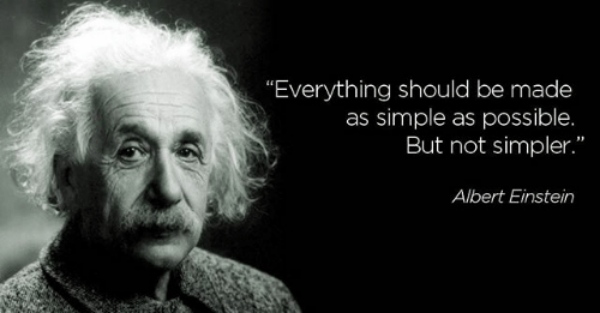Our URGENT need for simplicity, summarized
It’s high time to listen to Einstein, really.

Economists tend too often to forget certain hard limits of certain technologies and organizations on which every bombastic assumption that the current western lifestyle can continue indefinitely (and no, this has nothing to do with environmental issues). Limits like these, from “Peak Complexity”, all going to Einstein’s advice that “Everything should be as simple as possible, but not simpler”:
Limits to human cooperation
Building driverless cars and cities that can handle them is infinitely more complex than building pyramids, even with “artificial intelligence” (if nothing else because that, too, would have to be achieved by human cooperation on unseen scales). The same applies to bearing the maddening, ever growing bureaucracy that surrounds many of us.
Peak cost reduction of renewables

-
Wind turbines cannot capture more than 59.3% of the kinetic energy of wind. Current best practice has already reached about 45%, leaving room only for modest and gradual increases in efficiency.
-
The maximum theoretical efficiency of photovoltaic panels is 33.7%, not very far ahead of current best practice of about 26%.
In general, lots of technologies tend to get cheaper substantially in the early phases of their lifecycle only, when there is still plenty of room for improvement in their manufacturing processes, and raw material extraction is on the rise. Today however, photovoltaic and wind energy technologies are far-far away from being new, and their raw materials' “production” are peaking soon.
In other words: these are mature technologies, where a few cents saved here and there are considered great achievements. Anything more than that comes from forced labor (polysilicon production in China), or from crossing some pretty basic environmental and health standards (take cobalt extraction in the Congo for example).
My own, 2-points executive summary
The “Peak Complexity” post contains much more about how our way of living already has reached a peak complexity that may soon bite us pretty hard (and already is, in many cases and places). Personally, I would give these two reasons to read that whole essay, and vote accordingly:
- If that essay had to be synthesized with one sentence, it would be “the sooner we deliberately simplify our lives, the less they will simplify themselves anyway, just in unpredictable, hardly painless ways”
- Note how almost none of those arguments are influenced by climate change, or other “green issues”, or even the likes of degrowth. They are all about **humans being way too “clever” and self-complicated for their own good, regardless of pollution, climate, biodiversity and so on
Who writes this, why, and how to help
I am Marco Fioretti, tech writer and aspiring polymath doing human-digital research and popularization.
I do it because YOUR civil rights and the quality of YOUR life depend every year more on how software is used AROUND you.
To this end, I have already shared more than a million words on this blog, without any paywall or user tracking, and am sharing the next million through a newsletter, also without any paywall.
The more direct support I get, the more I can continue to inform for free parents, teachers, decision makers, and everybody else who should know more stuff like this. You can support me with paid subscriptions to my newsletter, donations via PayPal (mfioretti@nexaima.net) or LiberaPay, or in any of the other ways listed here.THANKS for your support!